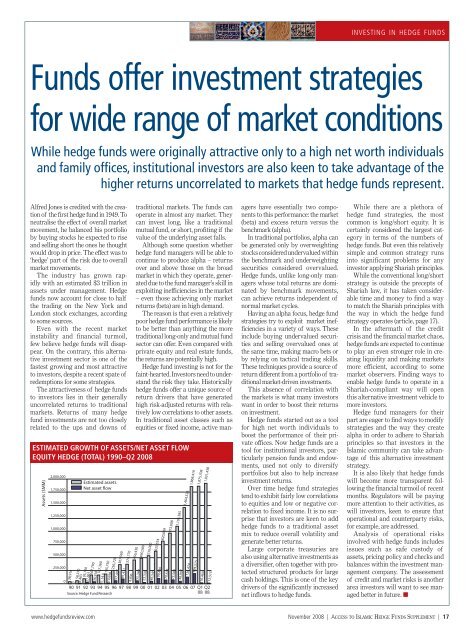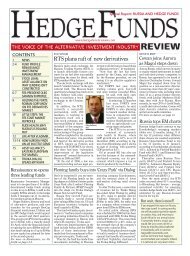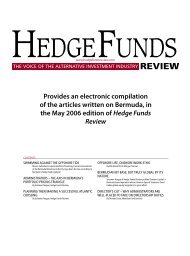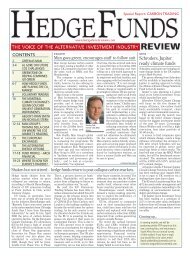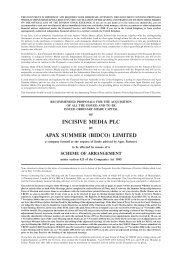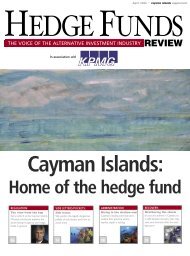Access to Islamic Hedge Funds - Incisive Media
Access to Islamic Hedge Funds - Incisive Media
Access to Islamic Hedge Funds - Incisive Media
You also want an ePaper? Increase the reach of your titles
YUMPU automatically turns print PDFs into web optimized ePapers that Google loves.
investing in hedge funds<br />
<strong>Funds</strong> offer investment strategies<br />
for wide range of market conditions<br />
While hedge funds were originally attractive only <strong>to</strong> a high net worth individuals<br />
and family offices, institutional inves<strong>to</strong>rs are also keen <strong>to</strong> take advantage of the<br />
higher returns uncorrelated <strong>to</strong> markets that hedge funds represent.<br />
Alfred Jones is credited with the creation<br />
of the first hedge fund in 1949. To<br />
neutralise the effect of overall market<br />
movement, he balanced his portfolio<br />
by buying s<strong>to</strong>cks he expected <strong>to</strong> rise<br />
and selling short the ones he thought<br />
would drop in price. The effect was <strong>to</strong><br />
‘hedge’ part of the risk due <strong>to</strong> overall<br />
market movements.<br />
The industry has grown rapidly<br />
with an estimated $3 trillion in<br />
assets under management. <strong>Hedge</strong><br />
funds now account for close <strong>to</strong> half<br />
the trading on the New York and<br />
London s<strong>to</strong>ck exchanges, according<br />
<strong>to</strong> some sources.<br />
Even with the recent market<br />
instability and financial turmoil,<br />
few believe hedge funds will disappear.<br />
On the contrary, this alternative<br />
investment sec<strong>to</strong>r is one of the<br />
fastest growing and most attractive<br />
<strong>to</strong> inves<strong>to</strong>rs, despite a recent spate of<br />
redemptions for some strategies.<br />
The attractiveness of hedge funds<br />
<strong>to</strong> inves<strong>to</strong>rs lies in their generally<br />
uncorrelated returns <strong>to</strong> traditional<br />
markets. Returns of many hedge<br />
fund investments are not <strong>to</strong>o closely<br />
related <strong>to</strong> the ups and downs of<br />
Assets ($MM)<br />
2,000,000<br />
1,750,000<br />
1,500,000<br />
1,250,000<br />
1,000,000<br />
750,000<br />
500,000<br />
250,000<br />
38,910<br />
0<br />
58,370<br />
Estimated assets<br />
Net asset flow<br />
8,463<br />
95,720<br />
27,861 167,790<br />
36,918 167,360<br />
(1,141) 185,750<br />
14,698 256,720<br />
57,407 367,560<br />
91,431<br />
374,770<br />
4,406 456,430<br />
55,340 490,580<br />
0<br />
90 91 92 93 94 95 96<br />
Source: <strong>Hedge</strong> Fund Research<br />
estimated growth of assets/net asset flow<br />
equity hedge (<strong>to</strong>tal) 1990–Q2 2008<br />
23,336 539,060<br />
99,436<br />
46,545 625,554<br />
820,009<br />
972,608<br />
1,105,385<br />
70,635<br />
73,585<br />
1,464,526<br />
1,868,419<br />
46,907<br />
126,474<br />
194,515<br />
1,875,708<br />
1,931,438<br />
16,469<br />
12,515<br />
97 98 99 00 01 02 03 04 05 06 07 Q1 Q2<br />
08 08<br />
traditional markets. The funds can<br />
operate in almost any market. They<br />
can invest long, like a traditional<br />
mutual fund, or short, profiting if the<br />
value of the underlying asset falls.<br />
Although some question whether<br />
hedge fund managers will be able <strong>to</strong><br />
continue <strong>to</strong> produce alpha – returns<br />
over and above those on the broad<br />
market in which they operate, generated<br />
due <strong>to</strong> the fund manager’s skill in<br />
exploiting inefficiencies in the market<br />
– even those achieving only market<br />
returns (beta) are in high demand.<br />
The reason is that even a relatively<br />
poor hedge fund performance is likely<br />
<strong>to</strong> be better than anything the more<br />
traditional long-only and mutual fund<br />
sec<strong>to</strong>r can offer. Even compared with<br />
private equity and real estate funds,<br />
the returns are potentially high.<br />
<strong>Hedge</strong> fund investing is not for the<br />
faint-hearted. Inves<strong>to</strong>rs need <strong>to</strong> understand<br />
the risk they take. His<strong>to</strong>rically<br />
hedge funds offer a unique source of<br />
return drivers that have generated<br />
high risk-adjusted returns with relatively<br />
low correlations <strong>to</strong> other assets.<br />
In traditional asset classes such as<br />
equities or fixed income, active managers<br />
have essentially two components<br />
<strong>to</strong> this performance: the market<br />
(beta) and excess return versus the<br />
benchmark (alpha).<br />
In traditional portfolios, alpha can<br />
be generated only by overweighting<br />
s<strong>to</strong>cks considered undervalued within<br />
the benchmark and underweighting<br />
securities considered overvalued.<br />
<strong>Hedge</strong> funds, unlike long-only managers<br />
whose <strong>to</strong>tal returns are dominated<br />
by benchmark movements,<br />
can achieve returns independent of<br />
normal market cycles.<br />
Having an alpha focus, hedge fund<br />
strategies try <strong>to</strong> exploit market inefficiencies<br />
in a variety of ways. These<br />
include buying undervalued securities<br />
and selling overvalued ones at<br />
the same time, making macro bets or<br />
by relying on tactical trading skills.<br />
These techniques provide a source of<br />
return different from a portfolio of traditional<br />
market-driven investments.<br />
This absence of correlation with<br />
the markets is what many inves<strong>to</strong>rs<br />
want in order <strong>to</strong> boost their returns<br />
on investment.<br />
<strong>Hedge</strong> funds started out as a <strong>to</strong>ol<br />
for high net worth individuals <strong>to</strong><br />
boost the performance of their private<br />
offices. Now hedge funds are a<br />
<strong>to</strong>ol for institutional inves<strong>to</strong>rs, particularly<br />
pension funds and endowments,<br />
used not only <strong>to</strong> diversify<br />
portfolios but also <strong>to</strong> help increase<br />
investment returns.<br />
Over time hedge fund strategies<br />
tend <strong>to</strong> exhibit fairly low correlations<br />
<strong>to</strong> equities and low or negative correlation<br />
<strong>to</strong> fixed income. It is no surprise<br />
that inves<strong>to</strong>rs are keen <strong>to</strong> add<br />
hedge funds <strong>to</strong> a traditional asset<br />
mix <strong>to</strong> reduce overall volatility and<br />
generate better returns.<br />
Large corporate treasuries are<br />
also using alternative investments as<br />
a diversifier, often <strong>to</strong>gether with protected<br />
structured products for large<br />
cash holdings. This is one of the key<br />
drivers of the significantly increased<br />
net inflows <strong>to</strong> hedge funds.<br />
While there are a plethora of<br />
hedge fund strategies, the most<br />
common is long/short equity. It is<br />
certainly considered the largest category<br />
in terms of the numbers of<br />
hedge funds. But even this relatively<br />
simple and common strategy runs<br />
in<strong>to</strong> significant problems for any<br />
inves<strong>to</strong>r applying Shariah principles.<br />
While the conventional long/short<br />
strategy is outside the precepts of<br />
Shariah law, it has taken considerable<br />
time and money <strong>to</strong> find a way<br />
<strong>to</strong> match the Shariah principles with<br />
the way in which the hedge fund<br />
strategy operates (article, page 17).<br />
In the aftermath of the credit<br />
crisis and the financial market chaos,<br />
hedge funds are expected <strong>to</strong> continue<br />
<strong>to</strong> play an even stronger role in creating<br />
liquidity and making markets<br />
more efficient, according <strong>to</strong> some<br />
market observers. Finding ways <strong>to</strong><br />
enable hedge funds <strong>to</strong> operate in a<br />
Shariah-compliant way will open<br />
this alternative investment vehicle <strong>to</strong><br />
more inves<strong>to</strong>rs.<br />
<strong>Hedge</strong> fund managers for their<br />
part are eager <strong>to</strong> find ways <strong>to</strong> modify<br />
strategies and the way they create<br />
alpha in order <strong>to</strong> adhere <strong>to</strong> Shariah<br />
principles so that inves<strong>to</strong>rs in the<br />
<strong>Islamic</strong> community can take advantage<br />
of this alternative investment<br />
strategy.<br />
It is also likely that hedge funds<br />
will become more transparent following<br />
the financial turmoil of recent<br />
months. Regula<strong>to</strong>rs will be paying<br />
more attention <strong>to</strong> their activities, as<br />
will inves<strong>to</strong>rs, keen <strong>to</strong> ensure that<br />
operational and counterparty risks,<br />
for example, are addressed.<br />
Analysis of operational risks<br />
involved with hedge funds includes<br />
issues such as safe cus<strong>to</strong>dy of<br />
assets, pricing policy and checks and<br />
balances within the investment management<br />
company. The assessment<br />
of credit and market risks is another<br />
area inves<strong>to</strong>rs will want <strong>to</strong> see managed<br />
better in future. n<br />
www.hedgefundsreview.com November 2008 | <strong>Access</strong> <strong>to</strong> <strong>Islamic</strong> <strong>Hedge</strong> <strong>Funds</strong> Supplement | 17


